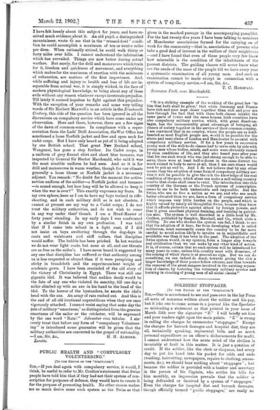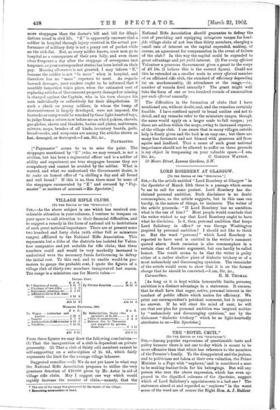SOLDIERS' STOPPAGES.
[To THE EDITOR OP TEl "SPZCTATOR.1 Sia,—One is accustomed to see and pass over in the lay Press all sorts of nonsense written about the soldier and his pay, but it irks one to come across in a journal like the Spectator so misleading a statement as that printed in your issue of March 15th over the signature " Z." I will briefly set him and your readers right upon the main points. " Z " is wrong in calling the charges he enumerates "stoppages." Except the charges for barrack damages and hospital diet, they are all, technically speaking, regimental bills, and as much personal expenditure as an officer's disbursements for mufti. I cannot understand bow the acute mind of the civilian is invariably at fault in this matter. It is just a question of credit. If the soldier, like the clerk or shopman, had every day to put his hand into his pocket for odds and ends (washing, haircutting, newspapers, repairs to clothing, amuse-
ments, we should hear nothing about " stoppages " ; but because the soldier is provided with a banker and secretary in the person of his Captain, who settles his bills for him monthly, an impression prevails that the soldier is being defrauded or deceived by a system of " stoppages." Even the charges for hospital diet and barrack damages, though officially termed " public stoppages," are really no more stoppages than the doctor's bill and bill for dilapi- dations usual in civil life. " Z " is apparently maware that a soldier in hospital through injury received in the actual per- formance of military duty is not a penny out of pocket while on the sick-list. But, as every soldier knows, most men go to hospital as a consequence of their own folly, and even there clear fivepence a day after the stoppage of sevenpence (not tenpence, as your correspondent states) has been levied on their pay. Messing allowance is not granted, I may inform " Z," because the soldier is not " in mess" when in hospital, and therefore has no " mess " expenses to meet. As regards barrack damages, your readers ought to be informed that a monthly inspection takes place, when the estimated cost of replacing articles of Government property damaged or missing is charged against the Captain, who in his turn charges his men individually or collectively for their dilapidations. If such a check on young soldiers, in whom the bump of destructiveness is largely developed, were not imposed, the barracks or camp would be wrecked by these light-hearted boys, to judge from a return now before me on which pokers, shovels, gas-globes, sheets and blankets, basins and plates, mattresses, mirrors, mops, brushes of all kinds, inventory boards, pails, bread-crocks, and soup-cans are among the articles shown as lost, damaged, or destroyed.—I am, Sir, &c.,
PAYMASTER.
[" Paymaster" seems to us to miss the point. The stoppages mentioned by " Z " (who, we may remark, is not a civilian, but has been a regimental officer and is a soldier of ability and experience) are true stoppages because they are compulsory and cannot be avoided by the soldier. What is wanted, and what we understand the Government desire, is to make an honest offer of "a shilling a day and all found and well found." If this is so, then there must be none of the stoppages enumerated by " Z " and excused by " Pay- master" as matters of account.—ED. Spectator.]











































 Previous page
Previous page